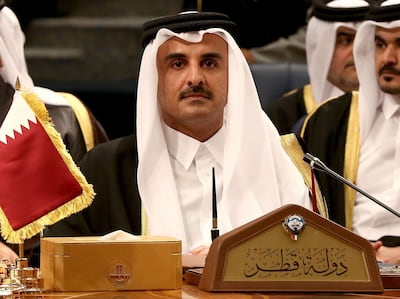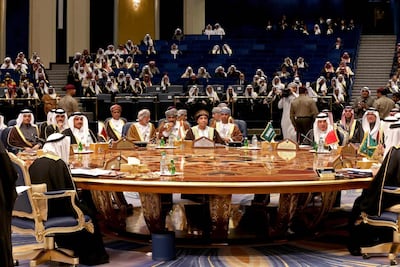Qatar is "isolating itself" by withdrawing from the organisation of oil-producing nations less than a week before GCC member states are expected to gather in Saudi Arabia for talks that one senior diplomat said he was “hopeful” could lead to a resolution to the 18-month regional crisis.
Following Qatar's shock announcement that they were withdrawing from the 15-member Opec on January 1, Oman's Oil minister, Mohammed Al Rumhi, said the peninsular nation was cutting itself off.
On Monday, UAE Minister of State for Foreign Affairs, Dr Anwar Gargash, said Qatar's Opec exit points to Doha's dwindling political role and influence.
"The economic part of the withdrawal is less important and does not justify the decision at this time," he tweeted.
Meanwhile, eyes in the region are firmly focused on formal letters being delivered to the leaders of the six Arab Gulf states inviting them to the 39th regional summit in Saudi Arabia. While the attendance of leaders from Saudi Arabia, United Arab Emirates, Kuwait, Oman and Bahrain are all but guaranteed, it remains to be seen whether Qatari Emir, Tamim Al Thani, will cross the border into Saudi Arabia for the first time since the diplomatic crisis began in 2017.
The last GCC summit, held in Kuwait, became a perfunctory exercise after Saudi Arabia, the UAE and Bahrain sent government officials rather than the countries' leaders to represent them in an apparent snub to Mr Al Thani who did attend.
The move reflected the political standoff between Qatar and the three boycotting GCC countries backed by Egypt, who accuse Doha of interfering in their internal affairs and supporting hard-line and extremist groups across the regions.
Oman was originally slated to host the 39th annual summit, but Saudi Arabia invoked a body bylaw to allow the Kingdom to intercede and host the meeting at the GCC headquarters in Riyadh. The surprise move is the first time Saudi Arabia has used the rule and was, observers say, an apparent move by Riyadh to ensure the attendance of senior representatives. As the dominant regional power, the fact that King Salman or his son, Crown Prince Mohamed bin Salman, are likely to chair the session will see the leaders of other GCC states travel the Saudi capital.
The attendance of the most senior Saudi leaders, and those of its closest GCC allies – Bahrain and the UAE – will place Qatar in a difficult situation. Either send a high-ranking official, or the emir himself, and be seen as conciliatory or to send a lower-level diplomat and risk being seen to publicly snub Saudi Arabia.

Doha was not represented by the Emir at the Arab League Summit, also held in Saudi Arabia, earlier this year.
Sources have said that GCC General-Secretary Abdullatif bin Rashid Al Zayani will visit Doha this week to relay an invitation from King Salman to attend the summit.
The last known direct contact between the leaders of Riyadh and Doha was a phone call last year.
_______________
Qatar quits Opec
Qatar will withdraw from Opec on January 1
Editorial: Qatar’s Opec pullout hinders GCC unity
_______________
While Michael Stephens, Research Fellow for Middle East Studies at the Royal United Services Institute think tank in London, said that the Qatari’s were likely looking to send the Emir but that it was "a matter of protocol”.
Kuwait's deputy foreign minister, Khaled Al Jarallah on Sunday said that there is no mechanism to ensure the heads of state will attend, but insisted that all six Gulf countries will be represented.
In November, Mr Al Jarallah said that the summit could present a "hope to resolve the Gulf crisis and solve the differences".
One observer suggested the move to hold the summit in Saudi Arabia could be a signal to Washington that Riyadh still has mechanisms to resolve regional disputes as the Trump administration has sought to convene a summit to bring all GCC countries together with the aim of resolving the boycott of Qatar.
Kuwait's Emir Sabah Al Ahmed has worked since the boycott broke out in 2017 to bring the sides together, acting as the chief mediator in the crisis. However, the three boycotting countries said that dialogue will only resume when they have seen an earnest attempt from Doha to change its ways, which they view as reckless.
Although Qatari Energy Minister Saad Al Kaabi said that the decision to withdraw from Opec on Monday was unrelated to the Arab boycott, it is likely to create more instability between Saudi Arabia and Qatar, analysts said.
The move came after signals that Saudi Arabia and Russia, not an Opec member, that they would extend a current production level deal in a move seen by markets in London and New York as an indication that the oil body would agree to further output cuts at a meeting in Vienna this week. Such moves are likely to see oil prices rise.
While Opec members would be bound by the deal, from January 1, Qatar can sell as much as it is able. While Doha's scale in relation to global output – especially in oil where it is a small player relative to its natural gas resources – is insufficient to alter price levels, it can piggyback off higher cost per barrel.
"I'm sure there will be a lot of disappointed faces. The Saudis, Emirates and Egypt who have an issue with Qatar and are trying to isolate it, in this move Qatar is isolating itself," said Oman's Mr Al Rumhi, in an interview with S&P Global Platts on Monday. "I would think Qatar would look for an opportunity to integrate itself, but maybe there are some other factors."
Energy and economic policies between the six nations have historically been watertight. Despite the 18-month boycott, Qatar still provides the northern emirates of the UAE and Oman with gas via the Dolphin pipeline.

However, with the recent announcement, their agreement could be at risk as the Omani minister said Doha could face backlash over its decision. Many states could also withdraw from the gas exporting countries forum, slated to be held in Doha next year.
The last time Saudi Arabia hosted the GCC summit was in 2015, where they issued a final communique which was spearheaded by a commitment to combat extremism and increase security co-operation.
_______________
Opec Analysis
Robin Mills: Doha move is a surprise, but not a severe blow
_______________
That is likely still to be the talking points for this year's summit, with an increased focus on drafting a framework for the creation of the Middle East Strategic Alliance, dubbed the Arab Nato.
The alliance will aim at creating a military force aimed at protecting the Arabian Gulf from threats, namely Iran. However, with the boycotting countries and Qatar’s icy relationship, a solution to the crisis might need to precede the creation of a joint military force that includes them.
Yemen is also on the agenda, with UN-backed peace talks taking place in Sweden this week likely to still be ongoing when GCC leaders sit down in Saudi Arabia.


